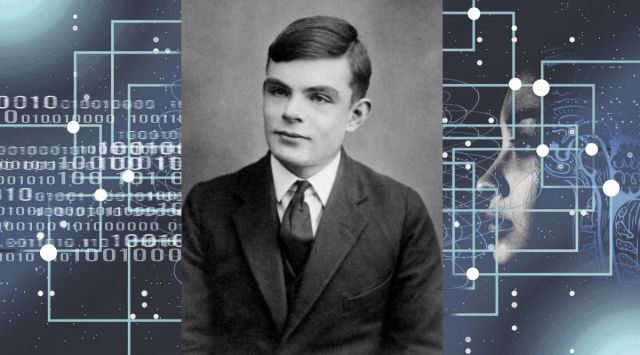Artificial Intelligence is rapidly taking over the world, from chatbots to technologies that are seemingly impacting everyday life. These technologies and their applications have triggered polarised reactions around the world. Any discussion around AI or Machine Learning in 2023 is incomplete without the mention of where it all started.
And, talking about the genesis of AI, Alan Turing is widely considered to be the father of artificial intelligence. June 23 marks the 111th birth anniversary of the luminary English mathematician and computer scientist whose work is regarded as a seminal point in the development of AI over the years.

The child prodigy with an Indian connection
Turing was born in London, England on June 23, 1912, the same year the British passenger liner Titanic sank in the North Atlantic Ocean claiming the lives of over 1600 people. Turing was the son of Julius Mathison Turing who held an esteemed position in the Indian Civil Service (ICS) of the British government at Chatrapur which was formerly part of the Madras Presidency. He hailed from a Scottish family of merchants. Turing’s mother, Ethel Sara Turing was the daughter of Edward Waller Stoney who was the chief engineer of the Madras Railways.
Story continues below this ad
From a young age, Turing demonstrated extraordinary mathematical skills. He studied mathematics at King’s college, Cambridge, and later joined the Government Code and Cypher School – the British codebreaking company during World War II. His work here involved decrypting German codes including those that were created by Enigma Machine – a cipher device that was developed in the mid 20th century to safeguard diplomatic and military communication. Turing’s contribution in code-breaking at that time is regarded as highly significant.
Once the war was over, Turing turned his focus to computer science and artificial intelligence. He developed the concept of the universal machine which is now known as the Turing machine. The universal machine is believed to have laid the foundation for modern computing. Turing’s thesis on ‘Computable Numbers’ is believed to have introduced the concepts of algorithms and computability.
 From a young age, Turing demonstrated extraordinary mathematical skills. (Image: Pixabay)
From a young age, Turing demonstrated extraordinary mathematical skills. (Image: Pixabay)
Tragic end
Turing died by suicide on June 7, 1954, at the age of 41. The renowned mathematician is believed to have met with a tragic end. There are no details around the circumstances surrounding his death. However, it is believed that he consumed an apple laced with cyanide. The computer scientist’s life was chequered with numerous hurdles. In 1952, Turing was convicted of gross indecency, owing to his homosexuality, by a UK court. He was sentenced to undergo hormone therapy, which was back then a court-mandated alternative to incarceration. The therapy had severe emotional and physical effects on Turing.
Why Turing continues to be the bedrock of all developments in AI
Turing’s foundational contribution and visionary thinking is seen as pivotal in all model AI technologies. Although his contributions to modern AI technologies are indirect, he is credited for laying the groundwork for many concepts that foster AI today. Here is a look at how Turing has influenced the rapid AI surge in 2023.
Story continues below this ad
The Turing test: The famous test named after the late mathematician is a test done to assess a machine’s ability to demonstrate intelligent behaviour that is identical to humans. While the test remains a matter of contention, it has influenced almost all the developments related to natural language processing and conversational AI chatbots.
Machine intelligence: It is believed that Turing’s exploration in the domain of machine learning laid the foundation for the field of AI. His revolutionary ideas challenged the notion that machines were only meant to perform pre-programmed tasks. Turing’s view opened a new vista on the concept of adaptive systems.
Computational thinking: His contribution to computability and the universal machine is believed to have laid a theoretical foundation for algorithms and computation. These concepts are today fundamental to modern AI systems and are assisting them in processing and analysing large amounts of data with ease.
Artificial neural networks: In 1950, Turing published a paper ‘Computing Machinery and Intelligence’. The thesis proposed the idea of artificial neural networks that can simulate the interconnected neurons in the human brain. Neural networks are seen as the building blocks of AI algorithms including deep learning. Besides, this paper is known to have introduced the Turing test to the general public.
Story continues below this ad
Even decades after his death, Alan Turing and his remarkable explorations in the field of computer science, mathematics, and artificial intelligence continue to inspire generations of AI researchers. The legacy of his work can be seen in computer vision, natural language processing, etc. Turing’s life and contributions have a lasting and profound impact on shaping the future of artificial intelligence.



 From a young age, Turing demonstrated extraordinary mathematical skills. (Image: Pixabay)
From a young age, Turing demonstrated extraordinary mathematical skills. (Image: Pixabay)





